Harlem Homecoming! Black community must change to have peace, Minister stresses in powerful N.Y. messages
By Askia Muhammad -Senior Correspondent- | Last updated: Oct 4, 2012 - 12:32:11 AMWhat's your opinion on this article?
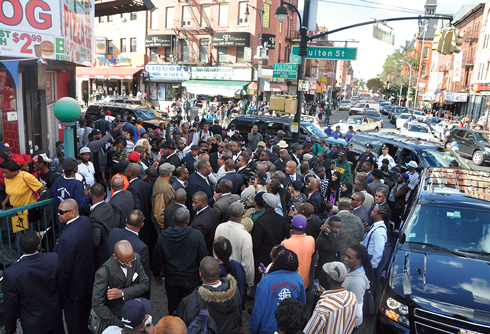
Crowds flock to Farrakhan as he delivers powerful message of peace in the Black Mecca as well as other parts of New York and New Jersey following trip to Cuba.
|
Black community must change to have peace, Minister stresses in powerful N.Y. messages
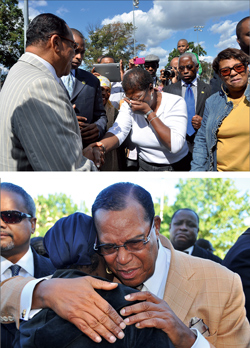
(top) A woman overcome with emotion greets Min. Farrakhan (bottom) Min. Farrakhan greets member of the crowd.Photos: Marc D. Muhammad
|
“I am so happy to be home, where it all began,” the Minister said to more than 1,000 gathered on the plaza in front of the Powell State Office Building. “I became a follower of the Honorable Elijah Muhammad right on that corner of 116th Street under the voice of Malcolm X.
“I could never have had a better teacher to discipline me and make of me the man that I wanted to become, and you can’t be a man until you meet a man. Brother Malcolm was that man. The finishing touches were put on me, and still are being put on me by the Honorable Elijah Muhammad.”
The Muslim minister recalled his historic 10 years from 1965 until 1975 when he headed Muhammad Mosque No. 7—the Nation of Islam’s largest—under Mr. Muhammad’s leadership.
After returning from a Caribbean tour which included meetings with the president of Cuba and the prime minister of Jamaica the week before, Minister Farrakhan went non-stop into a furious-paced, three-day, whistle-stop tour of greater New York, from New Rochelle, and Mt. Vernon, to Newark and back to troubled intersections in Bedford-Stuyvesant, Brownsville, Brooklyn, Flatbush, Jamaica Queens, Queensbridge and the Bronx. At each location he was greeted by enthusiastic crowds.
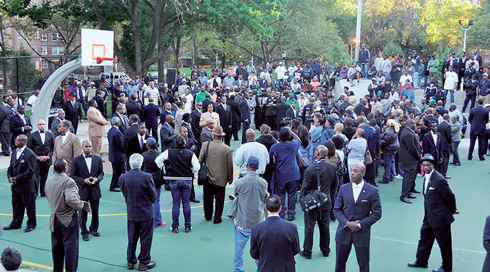
Large crowd gathers to greet Min. Farrakhan in N.Y.
|
The Harlem reunion day began with an early morning assembly for 1,100 students at Newark’s Central High School. The Minister’s motorcade then rushed Uptown, past Madison Square Garden, Randall’s Island—landmarks of the leader’s career building and re-building the Nation of Islam in New York City over the last, nearly 50 years.
“I thought it was a great speech. I thought it was very inspirational to these kids, and these kids are like, this is a gift for them to be able to hear that at this kind-of age, you know, this kind of teen-age, that transitional period in their life,” world-renowned poet Amiri Baraka told The Final Call following Minister Farrakhan’s remarks at Central High School where Mr. Baraka’s son Ras Baraka is the principal.
“So, this is going to be, I hope the most thoughtful of the students will be able to use this for the rest of their lives,” Mr. Baraka continued. “The greatest thing he said to them was that nobody can’t tell you what you can’t do. Like if you can conceive it, you understand, and you can point at it, you can do it.”
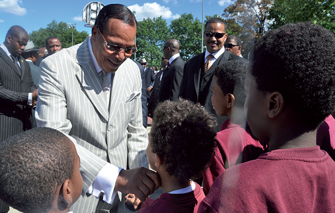
Young men take advantage of an opportunity to meet and share words with Min. Farrakhan.
|
“Sometimes if (police) see you with a gun, they’ll just shoot you, and say; ‘What the heck, I just killed me another savage, a nigger,’ and think nothing of it.” They might even stop off at a fast food restaurant for a snack afterward. “But, you’re just as cold too. You shoot your brother down and if he doesn’t look like he’s dying fast enough, you’ll put 10 more bullets in your brother, who’s not your real enemy!”
Again and again, Minister Farrakhan repeated the message. “Pastors, you don’t need to be in the church. Imams, you don’t need to be in the mosques—you need to be in the streets,” he said, calling the Rev. Vernon Williams, and the Rev. Al Taylor, pastor of Infinity Mennonite Church to stand beside him in Rucker Park. Both pastors have themselves taken their ministries to the streets to help comfort troubled families and to prevent further violence in the upper-Harlem neighborhood.
Explaining that he understands the role unemployment plays in creating frustration and increasing hopelessness in our people, Min. Farrakhan unfolded a crumpled dollar bill, then asked, when did that piece of paper become something over which to spill blood in the Black community?
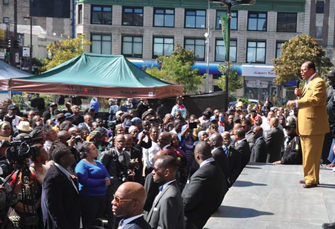
Minister Farrakhan went non-stop into a furious-paced, three-day, whistle-stop tour of greater New York, from New Rochelle, and Mt. Vernon, to Newark and back to troubled intersections in Bedford-Stuyvesant, Brownsville, Brooklyn, Flatbush, Jamaica Queens, Queensbridge and the Bronx. At each location he was greeted by enthusiastic crowds.
|
Black people do not have factories in which to manufacture guns, nor planes to fly them or drugs into the inner cities, yet those items are present in Black communities in great numbers. “You ain’t manufacturing no guns, but you got some. Your people are being herded into a lifestyle—that is going to jail. They are building prisons, and who are they for? Not for the White man.”
“The violence that we are doing to one another is a part of a scheme. A lot of the gangs don’t even know why they’re killing one another, it’s now a culture. See, but you’re killing each other because of the ignorance of the mind that the enemy is manipulating. You are looking for change to come, but change will not come out of the sky. You are the agent of change.”
At nearly every stop the Muslim leader quoted Michael Jackson’s “Man in the Mirror.” With audiences reciting the lyrics in unison with him, the Minister, pointed out that each person has the ability to be the agent of change for which the world is waiting.
“We are holding ourselves back. You can’t keep blaming the White man. What are we doing today to undo what he did to us? Go home and look in the mirror and see the real person to make the change.
“Michael Jackson said, ‘I’m looking at the man in the mirror.’ And what is he asking him to do? ‘Change his ways. No message could be any clearer than if you want to make the world a better place,’ do what? ‘Take a look at yourself’ and do what? ‘Make that change!’ The Holy Quran said it like this: ‘God will never change the condition of a people until they first change themselves.’ ”
Noting that he will be 80-years-old in seven months, the Nation of Islam minister said, “I’ve been teaching for 57 years and I’m not tired! When I’m dead, then I’ll retire, and I’ll still reach out to you from the grave.”
INSIDE STORIES AND REVIEWS
-
-
About Harriett ... and the Negro Hollywood Road Show
By Rabiah Muhammad, Guest Columnist » Full Story -
Skepticism greets Jay-Z, NFL talk of inspiring change
By Bryan 18X Crawford and Richard B. Muhammad The Final Call Newspaper @TheFinalCall » Full Story -
The painful problem of Black girls and suicide
By Charlene Muhammad -National Correspondent- » Full Story -
Exploitation of Innocence - Report: Perceptions, policies hurting Black girls
By Charlene Muhammad -National Correspondent- » Full Story -
Big Ballin: Big ideas fuel a father’s Big Baller Brand and brash business sense
By Bryan Crawford -Contributing Writer- » Full Story






 Click Here Stay Connected!
Click Here Stay Connected!








